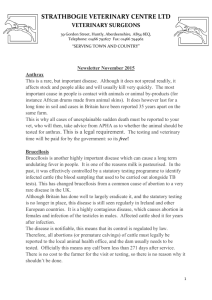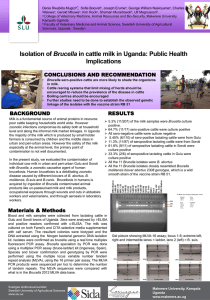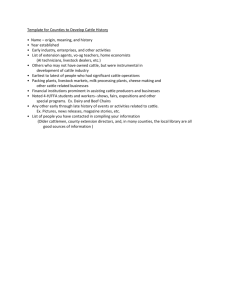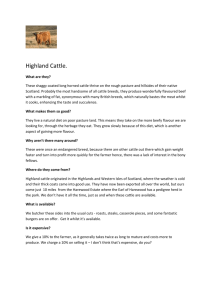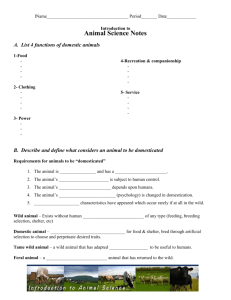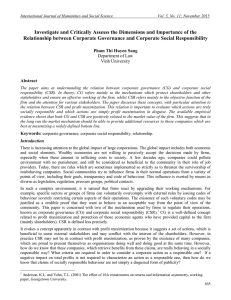University of Baghdad Veterinary Medicine College Name
advertisement
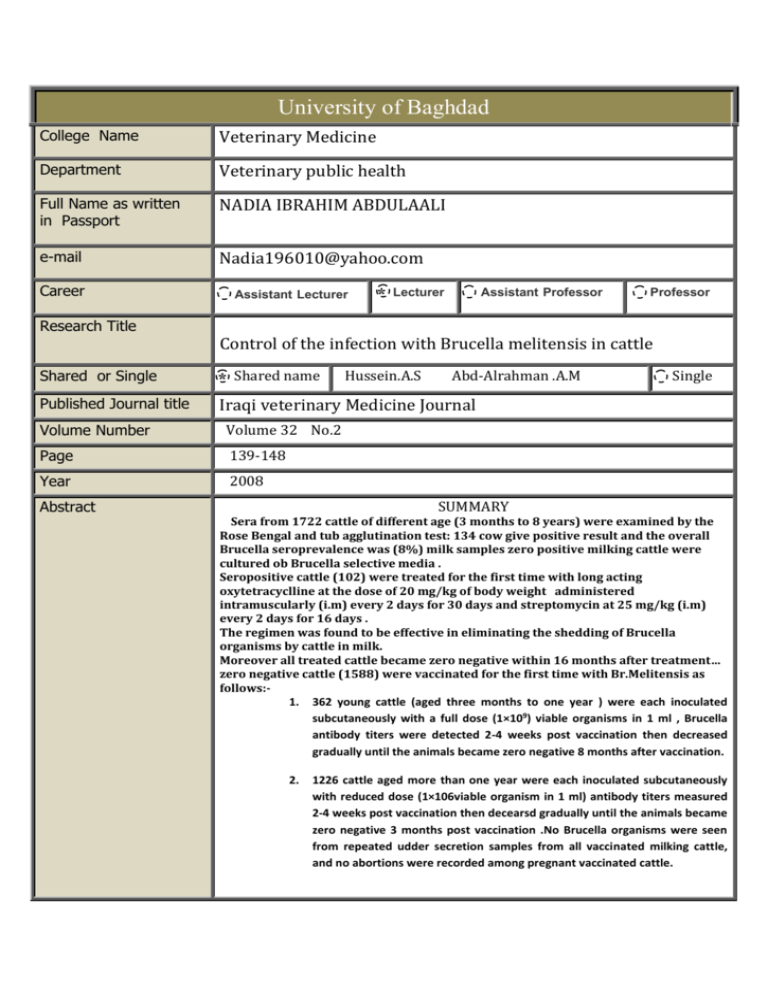
University of Baghdad College Name Veterinary Medicine Department Veterinary public health Full Name as written in Passport NADIA IBRAHIM ABDULAALI e-mail Nadia196010@yahoo.com Career Research Title Assistant Lecturer * Lecturer Assistant Professor Control of the infection with Brucella melitensis in cattle Shared or Single * Shared name Published Journal title Iraqi veterinary Medicine Journal Volume Number Volume 32 No.2 Page 139-148 Year 2008 Abstract Professor Hussein.A.S Abd-Alrahman .A.M Single SUMMARY Sera from 1722 cattle of different age (3 months to 8 years) were examined by the Rose Bengal and tub agglutination test: 134 cow give positive result and the overall Brucella seroprevalence was (8%) milk samples zero positive milking cattle were cultured ob Brucella selective media . Seropositive cattle (102) were treated for the first time with long acting oxytetracyclline at the dose of 20 mg/kg of body weight administered intramuscularly (i.m) every 2 days for 30 days and streptomycin at 25 mg/kg (i.m) every 2 days for 16 days . The regimen was found to be effective in eliminating the shedding of Brucella organisms by cattle in milk. Moreover all treated cattle became zero negative within 16 months after treatment… zero negative cattle (1588) were vaccinated for the first time with Br.Melitensis as follows:1. 362 young cattle (aged three months to one year ) were each inoculated subcutaneously with a full dose (1×109) viable organisms in 1 ml , Brucella antibody titers were detected 2-4 weeks post vaccination then decreased gradually until the animals became zero negative 8 months after vaccination. 2. 1226 cattle aged more than one year were each inoculated subcutaneously with reduced dose (1×106viable organism in 1 ml) antibody titers measured 2-4 weeks post vaccination then decearsd gradually until the animals became zero negative 3 months post vaccination .No Brucella organisms were seen from repeated udder secretion samples from all vaccinated milking cattle, and no abortions were recorded among pregnant vaccinated cattle. University of Baghdad College Name Veterinary Medicine Department Veterinary public health Full Name as written in Passport NADIA IBRAHIM ABDULAALI e-mail Nadia196010@yahoo.com Career Assistant Lecturer * Lecturer Assistant Professor Professor Research Title Effect of carrot extract on pseudomonas aeroginosa Shared or Single Published Journal title Volume Number Shared name Pakistan journal of Nutrition Volume 8 No.4 Page 373-376 Year 2009 Abstract * Single SUMMARY The aim of this study is to evaluate the effect of alcoholic and watery extracts of Carrot on the growth of pseudomonas aeruginosa .The effect of cold alcoholic and watery extracts of carrot on the growth of pseudomonas aeruginosa was done by wells and filter papers methods. In addition the sensitivity of bacteria to the antibiotics as ampicillin ,Tetracyclin and Trimethprim on the growth of the bacteria in vitro was performed by serial dilutions of the Carrot extracts. The results revealed that the treatments with Carrot extracts especially the alcoholic extract was more efficient to inhibit the growth of pseudomonas aeruginosa in vitro. University of Baghdad College Name Veterinary Medicine Department Veterinary public health Full Name as written in Passport NADIA IBRAHIM ABDULAALI e-mail Nadia196010@yahoo.com Career Assistant Lecturer * Lecturer Assistant Professor Professor Research Title Shared or Single Detection of microbial load in imported UHT milk in Baghdad markets Single A.H.A.Al-Shamary * Shared name Published Journal title Al-Anbar Journal of Veterinary Sciences Volume Number Volume 4 Page 103-107 Year 2011 Abstract No.2 SUMMARY The aim of this study was concerned on the evaluation of the microbial load of imported UHT milk sold in deferent markets and stores in Baghdad. A total of 50 milk samples were collected, analyzed and processed during February till March 2011.A methylene blue reduction time. Resazurin reduction time and 2,3,5,-triphenyltetrazolium chloride ( TIC) reduction test were used for detection and numeration of microbial load according to the standard protocols of food and drug administration (FDA) and international organization for standardization (ISO)with some modifications . In this study ,TTC was added to plate count agar (PCA)for numeration of microorganisms in UHT milk samples, with the aim to verify the frequency of microorganisms that are enable to reduce TTC.Milk samples were decimally diluted in phosphate buffered saline and pour –plated in PCA plus 0.015% TTC colonies were counted after 24h and 48h incubation at 35° C. From a total of 50 sampls,7(14%) were contaminated with many types of bacteria according to results of tests used in this study specially gram negative roads such as E.Coli as well as high percentage of microorganisms enable to reduce TIC in UHT milk, which cannot be detected by laboratory producer=s based on the formation of red colonies .These finding suggest presence of high microbial load that contaminates some UHT or sterilized milk samples in Baghdad city ,So it is strongly recommended that these imported a products are monitored carefully.
